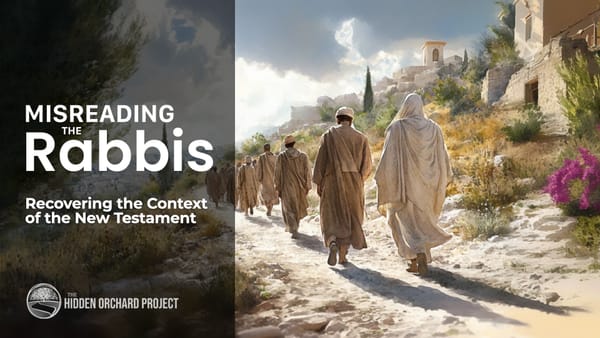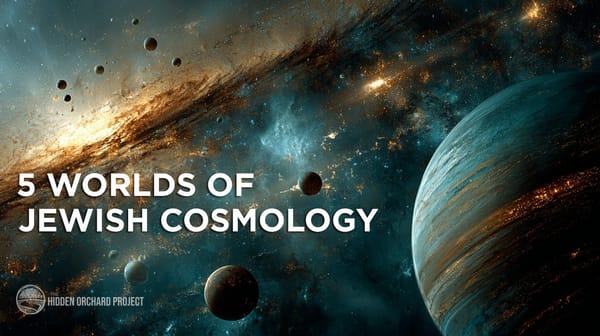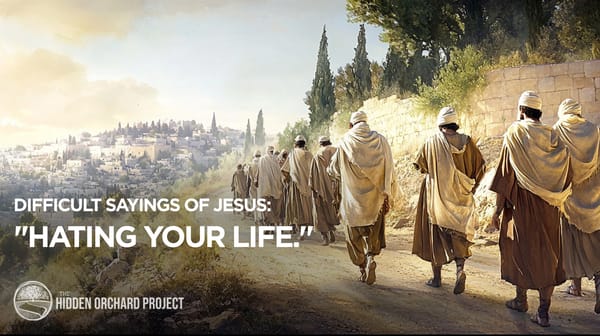Ibur: The Entanglement of the Soul in 1 John
What does it mean that G_D is in us, and we are in G_D? Learn how the deep mystical concept of Ibur holds a prominent place in the Apostolic writings, unlocking insight and dispelling errant theologies.

Beneath the surface of the Apostolic writings lies a matrix of intricate concepts and metaphors, concealed from most readers. A simple re-reading of the texts will not bring understanding as the key to unlocking these secrets lies within the Rabbinic tradition.
The following concept will demonstrate this point.
Giving of the Spirit
Let's begin by reading the following passage.
"No one has seen G_D at any time. If we love one another, G_D resides in us, and his love is perfected in us
By this we know that we reside in G_D and he in us: in that he has given us of His Spirit."
- 1 John 4:12-13
John begins with the principle that no one can see G_D - however - he shares that the Spirit of G_D now resides in his audience. These are not new ideas. The Hebrew Bible has many accounts of the Spirit dwelling amidst the Jewish people.
What is new is that the recipients of his letter are a majority (if not entirely) Gentile - marking a significant shift into new territory.
Throughout the letter, John drives the point that this spiritual connection has been enabled through the agency of Jesus, who himself is in G_D. But what does that mean?
Summarizing his key points, we learn that G_D resides in Jesus, and G_D now resides in John's audience, and they all reside in G_D.
Again, how does this work? How can a spirit reside in another, and what are the implications?
A Double Portion
We see this hinted in 2 Kings 2:9, when Elisha asks his teacher, Elijah, for a double portion of his spirit. The Hebrew word for spirit is "Ruach" (רוח)².
Shortly after Elijah was taken up by the chariot¹, we read:
“The spirit of Elijah has settled on Elisha!”'
Through the following chapters, we can infer that this extra portion elevates Elisha spiritually, enabling him to do more than he might of without it. By my count, there are twice as many recorded miracles of Elisha than Elijah.
But this is not a competition. Instead, it suggests that Elijah and Elisha are somehow working together as a kind of team. Elisha works from below and Elijah from above, both in service of G_D.
In the Rabbinic tradition, this transmigration of the soul is known as Ibur.
Ibur
Ibur (עיבור), in Hebrew, means "impregnation". Ibur is a kind of soul entanglement that occurs, commonly, between a teacher and their students. One primary reason for this connection allows the teacher to aid in a student's spiritual development. This can happen while the teacher is alive, but also after they pass on.
The Bible references Ibur, yet remains silent on how it works. Like many other topics, the textual silence might otherwise leave us to our own speculations if we do not possess a unifying oral tradition.
John's references in the Gospel - and there are many - are also vague, indicating that his audience had some degree of knowledge on the matter. At least enough to warrant not explaining further.
The dynamics of Ibur have been mostly concealed within the Rabbinic tradition for the last few thousand years.
Until the late 1500s.
The Arizal
Rabbi Isaac Luria³, known as the Arizal, lived a short but powerful life, revealing and explaining many of these well-kept secrets. Though he did not record his own teachings, his most prominent student did, unlocking a wealth of knowledge available to our generation.
In a work known as "Sha'ar HaGilgulim", the Arizal's teachings on Ibur are divulged. I have included more citations in a two-part article⁴, though the book itself is worth the money for one interested in further exploration.
The parallels to the Gospel writings are striking - making sense of many cryptic passages that have stumbled many for centuries, leaving a wake of division and heretical ideas.
Soul Connections
For many reasons, Elijah is somewhat of a unique case, though, Ibur is enabled through his connection to G_D. Though this, tradition maintains Elijah will play a major role in the precursor to the messianic redemption, an idea referenced many times throughout the Gospels.
The question remains, how is this possible when someone is no longer living in the physical world? How does the soul of someone who passed on interact with the souls of people on earth?
And, can this work for other righteous people? Yes.
As we read, it was the Ruach of Elijah that was imparted to Elisha, boosting Elisha to a higher state and closer proximity to G_D. On this, Rabbi Luria writes:
"... it is possible for an actual Spirit (Ruach) of a righteous person to be an ibur in a person; it can even be from the Spirits of earlier righteous people including the forefathers, their souls are in Gan Eden (the spiritual resting place) ..." - Sha'ar HaGilgulim Intro 2:3
The Arizal later describes the various ways a person can sever this connection through sin and impurity. As a result of errancy, a person is no longer in a suitable state to attain an Ibur.
Again, we see that spiritual purity is a vital component.
Chasidic thought suggests various soul connections are made through reading the works of an author, and listening to music and other influences. This should cause us to be careful about what, and who we listen to. This seems to be what John is referencing by "test the spirits" (1 John 4:1-6).
Whether inadvertent or intentional, sin stands as an indication that one has become disconnected. This makes sense of 1 John 3 where he explicitly uses the language of Ibur:
No one born of G_D makes a practice of sinning, for G_D’s seed abides in him; and he cannot keep on sinning, because he has been born of G_D.”
By this the children of G_D and the children of the devil are revealed: Everyone who does not practice righteousness—the one who does not love his fellow—is not of G_D. - 1 John 3:9-10
Recapping, this soul connection is dependent upon the purity of the soul and a genuine, and active participation in spiritual growth. This spiritual development necessarily involves the upholding of the Torah commandments and prohibitions.
For the Service of G_D
What is critical to grasp is that an Ibur is not the end goal, but for the purpose of better serving the Creator⁶.
An Ibur is a part of the righteous person's soul, which has attained a closer proximity to the Creator. When a righteous person passes from the physical world, their reach becomes amplified⁷. Through this connection, they form a lifeline, elevating the recipient of the Ibur to a higher level.

For a visual analogy, recall the field trip to the science center where the kids were made to stand in a large circle around a static electricity ball. When the person closest touched the ball, their hair would stand up, indicating a static charge has transferred. As each person put their hand on the shoulder of the person next to them, the charge transferred down the line.
Similarly, an Ibur allows one to connect to the Creator through a spiritual intermediary. This helps one better uphold the commandments, gain deeper insights into the Torah's wisdom, and attain a higher level of consciousness.
This also informs us of the functional aspects behind what many refer to as the "Holy Spirit." Notably, personal responsibility and lifestyle are as important as ever.
If one continues to live upright, they can retain connectivity with the Ibur.
“Whoever keeps his commandments abides in G_d, and G_d in him. And by this we know that he abides in us, by the Spirit whom He has given us.”
- 1 John 3:24
Now we can understand the destructive potential of theologies that teach that the Torah [commandments] have been abolished⁸, or that 'grace' somehow replaces the need for effort. These have done some damage, inadvertently cutting many off from higher levels of spiritual attainment.
Neither Jew nor Gentile
As we covered in our Messiah⁹ series, the Epistles sought to mitigate the unprecedented experience of Gentiles attaining spiritual elevation through a connection to Jesus. A degree of Ibur was democratized to the Gentiles, something believed to have only been for Jews.
This is what is meant by this often misunderstood passage:
Here there is neither Greek nor Jew, circumcised or uncircumcised, barbarian, Scythian, slave or free, but Christ is all and in all.
- Colossians 3:11
This did not make them Jews, nor did it replace the need for Jewish distinction and covenantal responsibility, it simply reflected that spiritual access to G_D has been made available to all. With this, we can lay another proof text for Replacement Theology aside.
Subscribe for FREE
In future articles, we'll explore how the concept of Ibur is relevant to understanding the traditions behind; the Messiah, the Holy Spirit, the Redemption, and other critical concepts that have been misinterpreted through time.
Want to Learn More?



Read this Paper on Academia:

Notes:
¹ 2 Kings 2:15
² https://www.thehiddenorchard.com/the-ruach/
³ https://www.chabad.org/library/article_cdo/aid/361878/jewish/The-Arizal.htm
⁴ https://www.thehiddenorchard.com/ibur-in-the-new-testament-1/
⁵ https://www.thehiddenorchard.com/the-soul-program/
⁶ Sha'ar HaGilgulim Intro 1:7
⁷ https://www.thehiddenorchard.com/an-advocate-with-the-father/
⁸ https://www.thehiddenorchard.com/abolishing-the-torah/
⁹ https://www.thehiddenorchard.com/messiah-program/
¹⁰ https://www.thehiddenorchard.com/replacement-theology-and-the-test-in-our-time/







